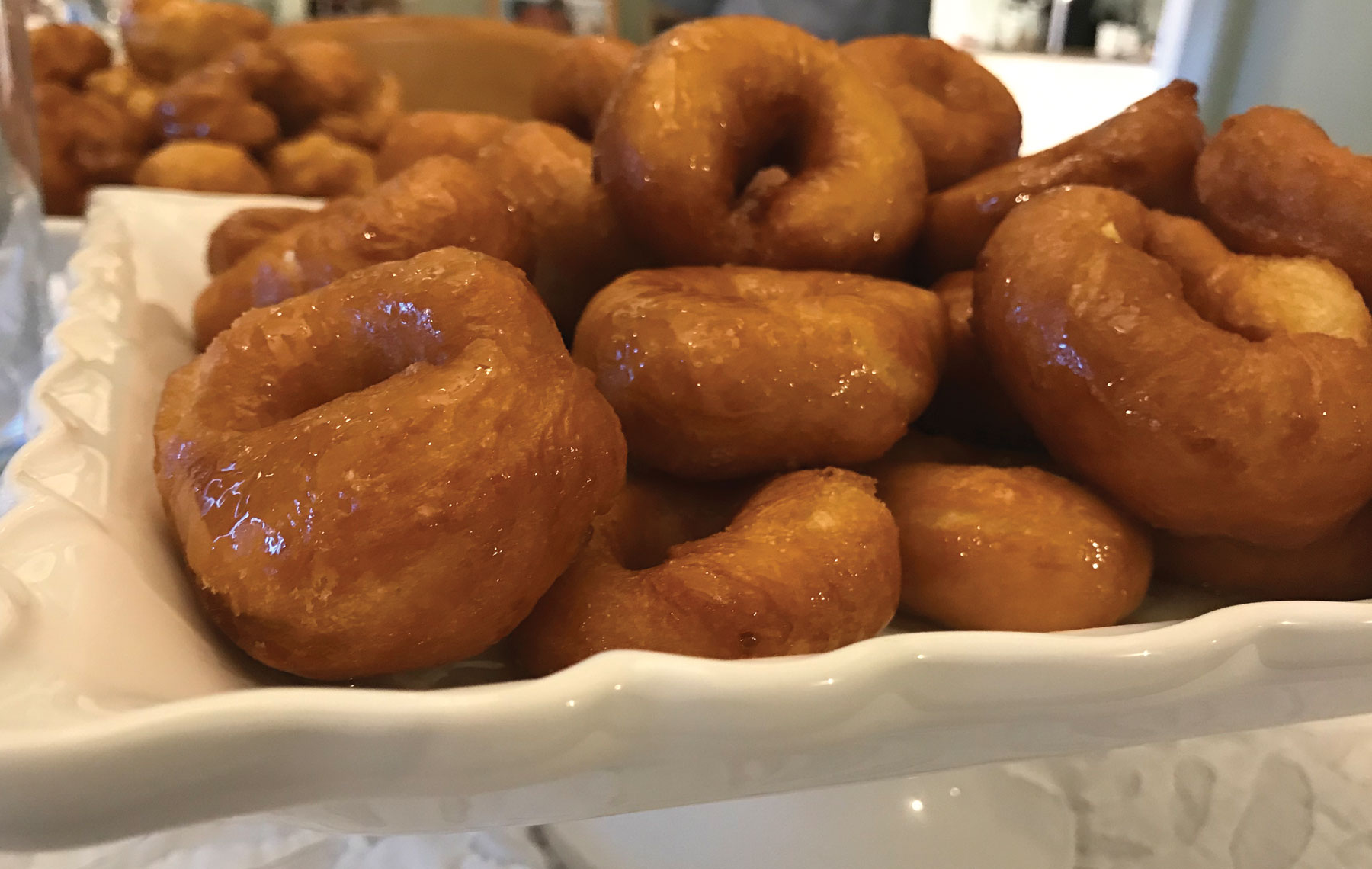
As I entered the Beverly Hills home of Rachel Emquies Sheff and her husband, Neil Sheff, on a recent Sunday morning, the warm welcome of my hosts and the sights, sounds and aromas that surrounded me left no doubt that I was about to be enveloped in the serene preparations for a memorable Sephardic celebration.
Scents of frying oil and orange zest tickled my nose. The beautifully decorated home’s intricate mezuzahs and hamsas, and a bowl of lemons next to several Ladino cookbooks caught my eye. I could feel Rachel’s and Neil’s excitement for the upcoming evening.
Rachel and Neil would be welcoming at least 30 people into their home to celebrate the first night of Hanukkah. Rachel had 20 pounds of peeled potatoes soaking for her latkes, trays labeled for her outpouring of food offerings, several menorahs ready for lighting, and different batches of dough waiting to be fried into Sephardic pastries.
While staying out of her way, Neil, chair and former executive director of the Sephardic Educational Center (SEC) in Los Angeles, helped get things in order while also sharing bite-size bits of history about L.A.’s Ladino and Sephardic communities.
The couple are Ladino and Sephardic and integrate their cultures through food during the holidays. She maintains the SEC’s food page on Facebook, which she had recently updated with posts of her Ladino and Sephardic doughnut recipes.
Rachel was born in Casablanca, Morocco, and moved with her family to the United States when she was 8 years old. One of the things that kept her family connected to their culture was her mother’s cooking.
“Basically cumin, paprika and ginger were always used, though my mom never cooked with much cinnamon because we were influenced with more Spanish culture,” Rachel said, adding that lemons, tomatoes and oranges were always imperative elements of their Moroccan and Spanish dishes.
“She was an incredible cook and picked it up from her mother,” Rachel said. “Now my oldest is an incredible cook, and I think because we are a family where we’re all about the food, my kids are always helping out in the kitchen. My oldest is even pursuing a career in food, learning the restaurant business.”
For the party, Rachel was preparing three simple variations of doughnuts: burmuelos — fried Turkish dough balls with a spongelike texture; sfenj — a puffy fritter popular in Morocco and North Africa; and rosquitas — dense, Spanish-influenced pastries that Rachel admitted were her favorite.

“It’s interesting its origins,” she said. “It’s amazing to me how one thing influenced that. You may not know what sufganiyot is but you might know [French] beignets or burmuelos. It’s very interesting to find out ‘Oh, you guys do the same things and you’re not even Jewish.’ It’s all different takes on a similar thing.”
While forming her doughnuts, Rachel stopped to think about how her mother, her inspiration, would do each step before moving on to the next. Each recipe was so ingrained in her memory that she would use it as a suggestion rather than a necessity.
Rachel said that, like music, food is a global language bringing people together. As her parents have gotten older, she has been cooking more for them and further appreciating how recipes ignite memories from long ago.
“All my girlfriends, we are super cooks and we are sharing recipes,” she said, “and thought we should start a Facebook page for all our members (at the SEC). It’s not a huge following but people really like it. I try to give food history in each post. Like, who made it in my family and what occasion I ate it at. And people tell me, ‘Oh my gosh, I haven’t had this since I was a little girl.’ And they are super excited because I reminded them of their memories. That’s really what food is — memories. Links to your life in every bite.”
As the smell of sweet doughnuts filled the kitchen, Rachel continued to drop dollops of dough balls into the hot oil. Each doughnut, once fried, got a bath in a light, sweet syrup. (Ladino and Sephardic doughnuts tend to be lighter than the heavy challahesque density of sufganiyot.)
Rachel’s rosquitas recipe is one she grew up eating and is made with orange juice and orange rind, and is dunked in a lemon syrup.
Rosquitas can be a little tricky to make if the dough is too sticky, Rachel explained as she added a little more flour.
“It’s been a year since I’ve made rosquitas. … My mother did it better, but they’re very nice. It’s sticky but it’s so therapeutic. It makes you feel good. You are creating something. You get the result and everyone enjoys it.”
Sheff’s tip: When frying, put a carrot in your oil to make it light and to help keep the oil from burning your treats.
Burmuelos
Adapted from “The Sephardic Cooks (Come Con Gana)” by the Sisterhood of Congregation Or Ve Shalom in Atlanta.
1/2 cup water
1 teaspoon instant yeast
3 cups flour
1 egg
Pinch of salt
Mix 1/2 cup of water with 1 teaspoon of instant yeast. Let sit till it is foamy. Then mix with 3 cups flour, 1 egg, 1 1/2 cups of warm water and a pinch of salt.
Mix to form a sticky, wet dough.
Cover and let rise for two hours. With a spoon or small ice cream scoop, drop dough into hot oil. They will puff up and rise to the top quickly. If they don’t, the oil is not hot enough.
For the syrup, mix 1 cup sugar, 3 tablespoons of honey and 1 /2 cup water in a sauce pan. Bring to a boil until thick.
Pour over burmuelos.
Serve hot.
Sheff’s tip: If you need to make ahead, make only the day of, and warm up in oven and then pour hot syrup over warm burmuelos. Don’t make them the day before because they get oily quickly. Best result is to serve right after frying.
Sfenj (Moroccan Doughnuts)
3 cups flour
2 teaspoons yeast
1 teaspoon salt
1 1/4 cup warm water
Dissolve yeast into 1/4 cup warm water.
Mix together flour and salt.
Mix together 1 cup warm water, yeast mixture and flour mixture by hand until well blended. (Dough will be extremely wet and sticky.)
Cover with plastic and a kitchen towel.
Let sit 2 hours.
Prepare a bowl of water to dip your hands in. When oil is hot, dip your hands in the water and very quickly grab a golf-ball-size piece of dough, poke a hole in it, and drop it into the oil. (If you take too long, the dough will stick to your hands.) Be careful not to drip any water from your hands into the oil, as it could splatter and burn you.
Sheff’s tip: Sfenj are freeform and not very pretty, so you will get odd shapes with all kinds of ridges and bubbles on them.
Rosquitas (Ladino Doughnuts)
3 eggs
1/2 cup sugar
1/2 cup oil
1/2 cup orange juice
Pinch of salt
Rind of 1 orange
1/2 tablespoon baking powder
Mix all ingredients and then start adding flour until you form a nice dough, not too firm and not too sticky. Makes about 4-5 cups.
Let rise 2-3 hours.
Take a golf-ball-size piece of dough, form it into a rope about 2 inches long, and pinch the ends together to make a circle/doughnut shape. Place on a cookie sheet. When you have formed all the doughnuts, start dropping them into hot oil. Watch closely and flip to make each side golden brown. Place on a wire rack.
Make a syrup of 1 cup sugar, 1/3 cup water, and a piece of lemon rind.
When sugar has dissolved and starts to thicken, take off heat and gently dip the rosquitas into the syrup with two forks, through the center, trying not to pierce them.
Pile on a platter and wait a bit to dry.
Sheff’s tip: “Rosquitas are denser and doughier then a typical doughnut. They can keep for a few days after frying. My mother made these for us year-round, not just for Hanukkah.





















 More news and opinions than at a Shabbat dinner, right in your inbox.
More news and opinions than at a Shabbat dinner, right in your inbox.